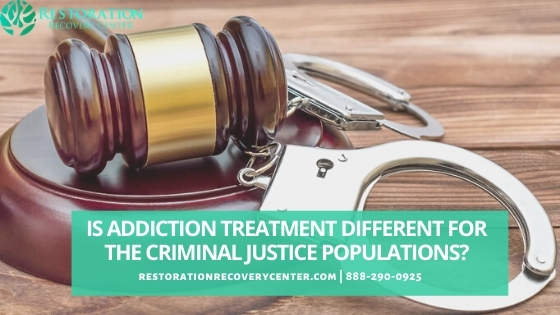Is addiction treatment different for the criminal justice populations?
Researches dating back to the mid-1970s have shown that addiction and substance abuse treatment can help drug-using criminal offenders to change their behaviors, attitudes, and beliefs towards drug addiction; and totally remove them from the life of drug abuse and criminal activities.
A large percentage of the principles used in addiction treatment are almost similar to the principles used on individuals in criminal justice system as well as those used on the general public. Unfortunately, a lot of offenders may not have a good access to the type of treatment they need. Poor quality treatment or inappropriately placed treatment programs to the different needs of offenders cannot be effective at discouraging crime as a result of drug abuse.
For this reason, the Auburn Outpatient Rehab Facility in California has come up with specific treatment programs for the criminal justice populations.

criminal justice populations
Apart from the general principles of addiction treatment, we have made some considerations especially for offenders, which include the following:
Treatment featuring some specific cognitive skills which can help the offenders adjust their beliefs and attitudes that might have lead them to drug abuse or crime. For example, feeling entitled to control everything, or have their own ways while not really understanding the consequences of such behaviors. These skills relate to their thinking, remembering, understanding, and learning.
All our treatment programs for the criminal justice populations include tailored services within our facilities, as well as transitions to community-based treatments, after serving their term.
We also make sure that there is an ongoing coordination between us and courts or the parole and probation officers so that we can continually address the complex requirements of all offenders who are re-entering the society.
Similarities in addiction treatment for the criminal justice populations and the general public
Although there are a lot of similarities between drug abuse treatment for individuals in the criminal justice system and the general population, the criminal justice population has extra stressors, including but not limited to, their legal situation. The criminal justice patients also tend to portray certain traits that can affect treatment. These can be criminal thinking or criminal values as well as other more typical resistance or denial issues common among other drug abuse populations.
A big percentage of the criminal justice populations come with a long history of various psychosocial problems that have a lot to do with their addiction problems: interpersonal problems with their family members, problems with sustaining long-term relationships, emotional disorders, anger management issues, little or no education or vocational skills, and difficulties in finding and sustaining gainful employment.
Some of the chronic problems are often associated with low self-esteem, depression, anxiety and unrealistic expectations about the result of their substance use. Unsuccessful attempts to veer away from drug abuse can also reinforce a negative self-image and increase the possibilities of the offenders turning to substances whenever they are faced with conflicts or stress.

criminal justice populations
At the auburn Restoration Recovery Center, our treatment approaches takes into account all the unique situations of individual offenders and their stages in the recovery process. Our treatment plans and assessments are continually revised to reflect changes in every client’s situation, such as recent relapses, continued sobriety, and improvements in mental and psychological functioning.
Reach out to us today for the most comprehensive addiction treatment programs in California.






